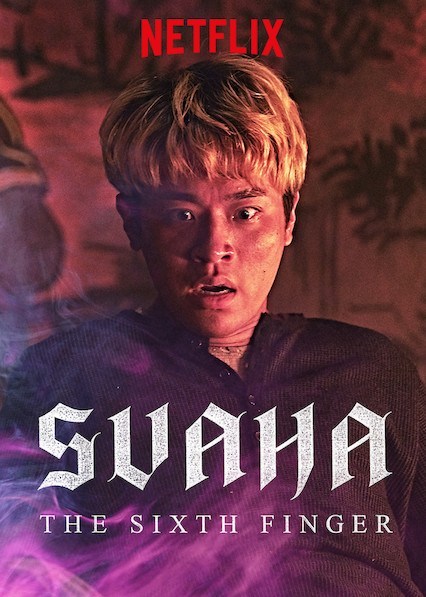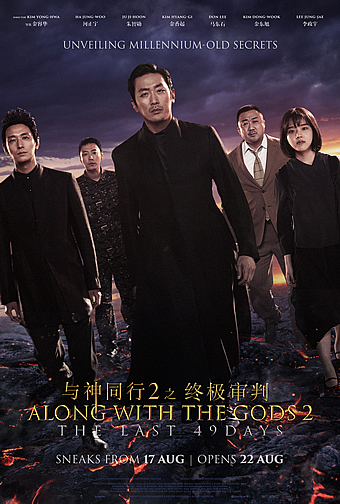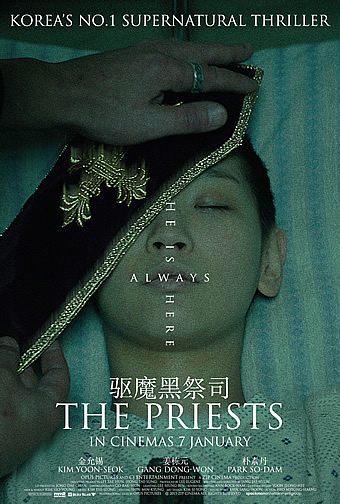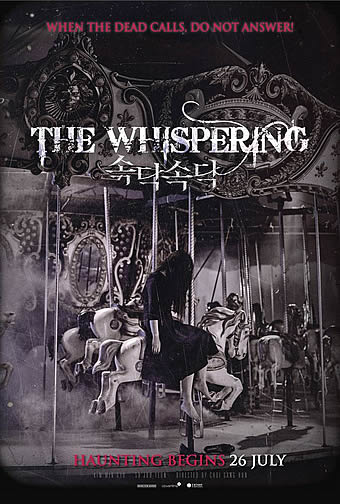THE DIVINE FURY (사자) (2019)
Genre: Horror
Director: Jason Kim
Cast: Park Seo-jun, Ahn Sung-ki, Woo Do-hwan
Runtime: 2 hrs 9 mins
Rating: NC16 (Horror)
Released By: Golden Village Pictures
Official Website:
Opening Day: 15 August 2019
Synopsis: After losing his father at a young age, Yong-hu repudiates the existence of God and resolves only to believe in himself. Years later he has become a martial arts champion, but one day he discovers stigmata on his palms (marks that correspond to the wounds suffered by Jesus on the crucifix). Hoping to rid himself of the painful stigmata, Yong-hu searches out Father AHN, and finds him while the priest is performing an exorcism. When Father AHN suddenly falls into danger, Yong-hu ends up saving him thanks to his stigmata and martial arts skills. Even while denying it, Yong-hu comes to realize the power of his stigmata, and as his fellowship with Father AHN deepens, he starts to perform exorcisms with him. However an evil figure named Jisin kills a girl named Min-joo who was recently exorcised by Father AHN and Yong-hu. Jisin hatches a plan to ensnare and kill more people. Father AHN and Yong-hu try to defeat him, but Father AHN is mortally wounded in the fight. Yong-hu takes strength from the God he once rejected, and faces off against Jisin...
Movie Review:
To writer-director Jason Kim’s credit, we’ve not seen an exorcism thriller with Mixed Martial Arts (MMA), so kudos to him for coming up with an intriguing concept to invigorate the occult-themed genre. Whether it in fact makes for a compelling watch is quite a different matter altogether, and it is in this regard that Kim’s attempt at creating a cinematic universe for the Korean film industry falls short.
The first in what is meant to be a ‘Holy Universe’, the movie pairs Park Seo-joon’s acclaimed MMA champion Yong-hu with Ahn Sung-ki’s veteran priest Father Ahn to take down Woo Do-hwan’s Satan-worshipper Ji-sin. Otherwise known as a Dark Bishop, Ji-sin has been luring innocent souls to pledge their loyalty to the devils he reveres, which he presents as an offering in return for eternal life. As part of God’s plan, Father Ahn is sent from the Vatican to investigate the recent spate of possessions, while Yong-hu mysteriously develops stigmata during this same period.
Though it may sound like a three-hander, ‘The Divine Fury’ is really focused on Yong-hu, who undergoes a faith transformation as he joins hands with Father Ahn. An extended prologue describes how Yong-hu had turned his back from God and church when he was a young boy, after neither his earnest prayers or that of a young priest managed to save his father, who was on duty at a traffic stop when he was run over by a drunk driver. Yong-hu is still seething 20 years later, but is fortunately protected from the dark side by his father’s spirit, embodied in the gold wedding ring he wears around his neck which used to belong to his dad.
At first, Yong-hu struggles to make sense of the wound which had appeared out of the blue on his right palm, but he discovers after stumbling upon a ritual that Father Ahn was in the midst of performing that it gifts him with the power to cast out demons. Even so, it will take a while before Yong-hu fully embraces his role as God’s crusader against evil next to Father Ahn, during which he will have to come to terms with his own pent-up resentment against God and come to discover the extent of his powers – in particular, the latter will see him (literally) apply his right hand onto the foreheads of the possessed, which causes the evil within them to erupt into bright white flames that will eventually extinguish without physically causing any signs of burns.
What triggers the change-of-heart though is the bond which develops between Yong-hu and Father Ahn, that is also intended to be the heart of the film. That their surrogate father-son relationship turns out surprisingly poignant is credit to both Park and Ahn, who share an engaging low-key chemistry that never pushes the credibility of what it is trying to portray; in fact, their conversations about faith and the way God works will probably strike a chord even with non-believers, and is a testament to the earnestness and sincerity with which both actors carry their roles next to each other. As you may suspect too, their bond will be tested and re-affirmed over the course of the film, especially in the run-up to the climax where Yong-hu goes head to head with Ji-sin.
Like we said, the emphasis of the storytelling has been placed quite squarely on Yong-hu, and that is a pity, because we would have loved as much to explore Ji-sin’s motivations for worshipping the Devil, as well as Father Ahn’s own conviction to fight on behalf of God despite the tolls and scars it has exerted on him. Not quite enough attention has been spent detailing how and why one of them chooses God, the other chooses Satan, and the last struggles on the fine line between good and evil before prevailing (predictably) on the side of the former. Without that character depth, the movie relies instead on a steady stream of exorcism sequences throughout its two-hour plus runtime to keep up the pace and momentum.
And in that regard, horror fans will probably not be disappointed, as these scenes are both frightening and exciting. Of note is one where Yong-hu and Father Ahn find themselves in the bedroom of a teenage girl whose demon within turns out to be a cunning and wily opponent; another in the basement of a Catholic orphanage where a young boy tests the mettle of a group of nuns and Father Ahn; and last but not least, the showdown in Ji-sin’s lair where he transforms into a part-man and part-amphibian creature after giving himself body and soul to the demons. Each of these encounters are intense and compelling, and hold their own against countless other such depictions in Hollywood films of the same genre.
Equally, the film serves up helpings of MMA action alongside the exorcisms, though the showpieces – one, where Yong-hu has to fight off Ji-sin’s fellow devil-worshippers in a nightclub; and two, where Yong-hu goes mano-a-mano with whatever Ji-sin has morphed into – are saved for the last third. While the idea of combining MMA with exorcism sounds intriguing in concept, writer-director Kim struggles to integrate both fully, so much so that the MMA elements seem superfluous and only so that Park can show off some martial arts moves.
Much hype has preceded the release of ‘The Divine Fury’, and the movie itself fails to live up to its own lofty expectations. Chiefly, it needs more character work on Ji-sin, Father Ahn and even Yong-hu, though the latter two are somewhat compensated by strong performances. That said, it is still engaging in how it depicts the eternal fight between good and evil, the tension between God’s ways and Man’s expectation, and the choices of faith that confront each and every one of us. It is also yet another in a recent string of South Korean films that have ventured into exorcism horror, and while it doesn’t stand out as much as say ‘The Wailing’ or even ‘Svaha: The Sixth Finger’, it’s a decent attempt at world-building that will require more to sustain into a franchise.
Movie Rating:




(Even as it struggles to mix MMA with the occult, this exorcism action-thriller remains a compelling watch for its portrayal of good versus evil, God's plan versus Man's expectation, and the choice of faith)
Review by Gabriel Chong
You might also like:
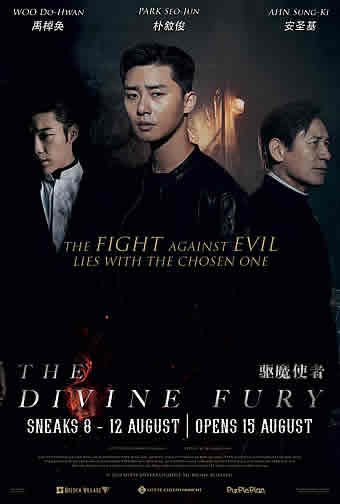
Movie Stills
.jpg)
.jpg)
.jpg)
_Woo Do-hwan.jpg)
_AHN Sung-ki.jpg)

